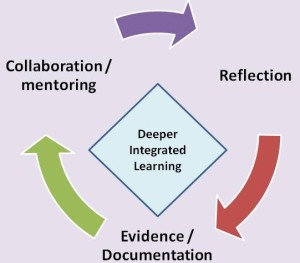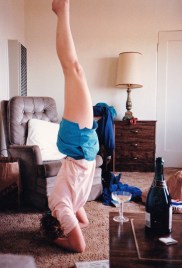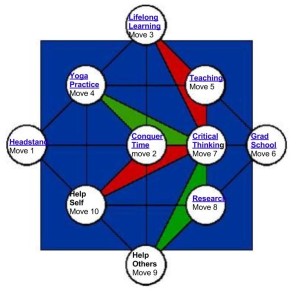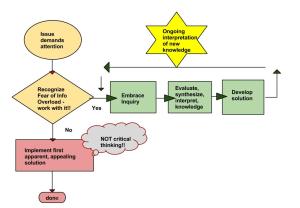Some connections from my collage of reflections
Reflective thinking, in short, means judgment suspended during further inquiry; and suspense is likely to be somewhat painful. –John Dewey
 My reflections on three key learning experiences, following the steps outlined in, About YOU – making connections from a collage of reflections, helped me develop a more cohesive view of my skills, knowledge and values while also helping me identify future actions I can take that will use my strengths in new ways, and address some weaknesses I’ve become more aware of.
My reflections on three key learning experiences, following the steps outlined in, About YOU – making connections from a collage of reflections, helped me develop a more cohesive view of my skills, knowledge and values while also helping me identify future actions I can take that will use my strengths in new ways, and address some weaknesses I’ve become more aware of.
Skills, Knowledge and Values in action
Learning about Yoga, and developing a life practice, involved research, applying information to new situations, and an early and ongoing respect for practices that promote physical and mental well-being through self care.
My accomplishments while teaching for the past 14 years, show frequent employment of problem solving, research, and communication skills, with an ongoing emphasis on issues related to the quality of life, such as sustainability, cultural diversity, and ethics.
Completing Graduate School, studying English literature, also demanded problem solving, research, and communication skills, and the abiding factor that made my work pleasurable, as well as satisfying, is an ongoing interest in human expression.
In summary, the skills I employed the most, in the learning experiences I examined, were research, problem solving, and communication skills, and the values that drove my decisions were consistently focused on humanity in diverse ways: improving the quality of life, for myself and others, learning effective ways to share information, and learning about people, to better understand what we do and why.
Making Connections
Playing the HipBones game gave me a chance to look at ideas that stood out for me from my reflections and explore connections between them. The resulting game surprised me with its integration:
Move 1: Headstand
Move 2: Conquer Time: connected to Headstand by A Yoga Upanishad that promises that he who practices the headstand for three hours daily conquers time
Move 3: Lifelong Learning: connected to Conquer time in the sense that if you don’t stop learning, you “conquer” one of the handicaps often imposed on us by the aging process
Move 4: Yoga Practice: connected to Headstand, as part of the practice, connected to Lifelong learning, as a practice that supports and contributes to lifelong learning, connected to Conquer time as a path that contributes to reducing the normally “inevitable” handicaps of aging on mind and body
Move 5: Teaching: connected to Lifelong Learning in the sense that the practice of teaching leads one to become a lifelong learner, connected to my Yoga Practice, in that I would like to broaden my teaching to include teaching yoga
Move 6: Grad School: connected to Teaching, because it improved my teaching, and made it possible for me to continue teaching
Move 7: Critical Thinking: connected to Teaching because the courses I teach often focus on Critical Thinking, and I need to employ Critical Thinking to teach well, connected to Grad School because I developed better critical thinking skills in Grad School, connected to Conquer Time, in the sense that the true reflective thinking necessary for critical thinking about difficult problems requires a “timeless” attitude, of an ongoing spirit of inquiry
Move 8: Research: connected to Grad school, because it was an integral part of that work, connected to Critical Thinking because it is an integral part of true critical thinking
Move 9: Help Others: connected to Research, because my research interests are often focused on learning how to help others, connected to Critical Thinking, because I often focus on helping others learn this practice, and I need critical thinking skills to help others effectively, connected to Conquer Time, because I’d like to help others “conquer time” by learning practices that keep them nimble in mind and body, such as Yoga, and Critical Thinking
Move 10: Help Self: connected to Help others, in that the two work together, you must help yourself to help others, when you help others you help yourself, connected to Critical Thinking, because true critical thinking helps one to live a good life through good decisions, connected to Conquer Time, because conquering time is a way to help oneself live a good life, connected to Yoga Practice, because this practice helps one to improve mental and physical well-being, connected to Headstand, because this particular pose helps the body and mind in many ways, including resting the heart and lower back, increasing oxygen to the brain, and improving concentration
What Limitations, Barriers, or Weaknesses can I Address?
I’ve heard people say that if you look at your strengths that’s where you may also find your weaknesses. As I reflected upon the key learning experiences I chose to focus on, I was fascinated to “see” from a new perspective, some opposing sets of behaviors around information management. On the one hand, from an early age, I’ve felt empowered to embrace new information and experiment with it in real applications in my life. On the other hand, I see that many times I have chosen to stop learning more about an issue, not because it isn’t relevant to me, but, perhaps, from a sense of inadequacy for evaluating and interpreting a vast quantity of information. Instead, I wanted simple answers. Ideally, I’d like to distill all available information into simple truths, but when I realize that a “simple truth” may not be possible, then I may suspend inquiry, leaving an issue inadequately addressed.
Examining my experiences, and learning more about the professional discourse on reflection, has led me to a greater awareness of the crucial value of pursing inquiry. I’ve learned that genuine critical thinking about ill-structured problems, those that cannot be solved by recognized algorithms, requires the ongoing inquiry of reflective thinking, “continual evaluation of beliefs, assumptions, and hypotheses against existing data and against other plausible interpretations of the data” (King & Kitchener, 1994, p. 7), to develop reflective judgments, that integrate and synthesize available information.
Taking Action – Applying what I’ve Learned
 Possible avenues for exercising my new found enthusiasm for further inquiry, that are consistent with my goals of understanding and helping others, include :
Possible avenues for exercising my new found enthusiasm for further inquiry, that are consistent with my goals of understanding and helping others, include :
- learning more about some world issues I care about that seem overwhelming, like the relationship between Israel and Palestine
- learning more about the art and science of teaching
- developing the necessary expertise to become part of the Yoga teaching community
- discovering and developing ways to apply and share the research I’ve been doing on Learning Portfolios
Note: If you’re interested in trying this process, and you’d like to follow the guidelines on my page: About YOU: Making connections from a collage of reflections, I’ll be happy to give you outside feedback on patterns, values, and themes I see in your collection of reflections, if you share them with me.
References
Dewey, J. (1910). How We Think [Kindle Edition]. Retrieved from Amazon.com
King, P., & Kitchener, K. (1994). Developing reflective judgment. San Francisco: Jossey-Bass.



